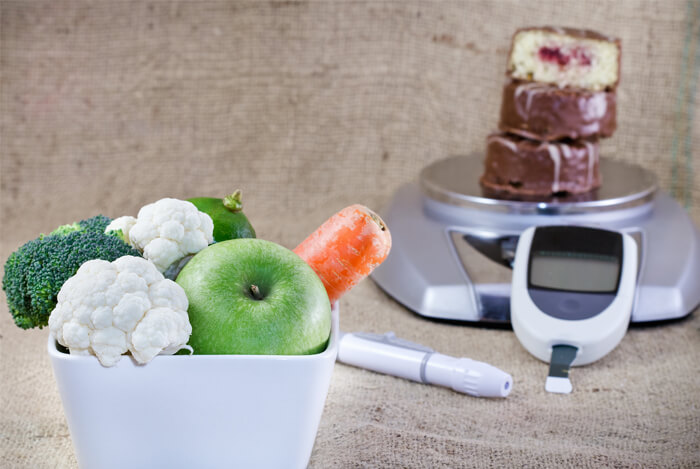Diabetes, particularly type 2 diabetes, is beginning to affect Americans at a greater rate than ever before. If it continues at the rate it’s going, 1 in 3 Americans will suffer from the disease by 2050.
A study performed at the University of California San Francisco found that data from 175 countries over the past decade revealed that “increased sugar in a population’s food supply was linked to higher type 2 diabetes rates”, while not “diminishing the importance of obesity”. They went on to say, about the development of diabetes, that “…sugar appears to play a prominent role”.
In this article I’ll be talking mostly about type 2 diabetes, so first, let’s clear up the difference between type 1 and type 2 diabetes.
- Comparing Type 1 and 2 Diabetes
- Are You at Risk For Diabetes?
- What Causes Diabetes?
- How You Can Avoid Type 2 Diabetes
Table of Contents
Comparing Type 1 and 2 Diabetes

The initial conditions in the body that lead to diabetes are still not entirely known. In fact, type 1 diabetes may be altogether unavoidable. But type 2 diabetes, that’s another story.
Type 1 diabetes is essentially an autoimmune disease; your body simply does not produce enough insulin. Your pancreas, for whatever reason, has decided (in many cases from birth) not to carry its own weight, so to speak. Your blood is full of glucose, ready to be used as fuel, but your body just isn’t getting the supply of insulin it needs to regulate it.
Type 2 diabetes is the most common form of the disease It’s caused by a combination of factors, the most prominent being insulin resistance. This can result from that horribly unhealthy diet, and it’s exacerbated by sedentary lifestyles.
Both forms of the disease are characterized by the ways in which the body treats high glucose levels in the blood. Having such high blood sugar can lead to all sorts of health issues and complications, along with an increased chance of developing other diseases. The blood sugar damages blood vessels and nerves, potentially causing heart disease, stroke, kidney disease, loss of mobility, depression, and more.
While the rarer type 1 may be more difficult to account for, there are ways of combating and even preventing type 2 altogether.


Are You at Risk For Diabetes?

Dr. C. Ronald Kahn, President and Director of the Joslin Diabetes Center says that even people who have a family history of diabetes, if they manage to stay thin and eat a healthy diet, have no more risk of diabetes than the general population. However, if they do become overweight, their risk of type 2 diabetes is ten times higher than the general population.
Close to 90% of people living with type 2 diabetes are overweight or obese. Such weight problems put stress on the body’s natural functions, making it difficult to keep that blood sugar balance.
Diabetes affects an estimated 9.3% of the population of the United States. According to the Centers for Disease Control and Prevention (CDC), if you’re of African-American, Hispanic, or American Indian descent, you are about twice as likely to be diagnosed with diabetes as a white American.
In itself, it’s the 7th leading cause of death in the United States, above influenza, kidney disease, and suicide. But the health complications it can lead to are responsible for much more misery.
What Causes Diabetes?

A lot of it has to do with their diets.
Sugars are known as simple carbohydrates. You find these all over the place, from fruits to dairy products, and virtually all sweet snack foods. Any diet that could be considered well-balanced will have these simple carbs present.
Now, the way the body reacts to all this sugar intake is somewhat difficult to digest. Every sugar or carbohydrate you eat is broken down by the body into glucose, and effects your blood sugar. Protein foods also contribute to blood sugar, but not as much as carbohydrate foods.
The body seeks to maintain a certain level of sugar in the blood at all times, around 100 mg/dL (fasting).
If you have diabetes, when you check your blood around two hours after a meal, your glucose level may be as high as 179 mg/dL. A person without diabetes would still be in the 90-110 mg/dL range.
When the body has an abundance of blood sugar – say, after a meal particularly packed with carbohydrates – the pancreas reacts by producing the hormone insulin to bring blood sugar levels back to normal.
If the body detects a shortage of sugar in the blood, your liver will do everything in its power to bring those blood sugar levels back up to that sweet spot, even tearing into your muscle tissues to harvest protein to convert into fuel.
57 million people in the United States have something called prediabetes, a condition where your blood sugar levels are abnormally high, but not quite to the point of being diabetic. Of that number, 15-30% will develop type 2 diabetes within the next 5 years. These numbers are staggering, to say the least.
How You Can Avoid Type 2 Diabetes

Consider the foods you eat carefully. Do you ever go for that crazy cappuccino with whipped cream and chocolate drizzle, when you could just as easily have a black coffee? Do you get the baked potato instead of the salad?
When you do go for the salad, do you smother it in ranch dressing?
These foods and toppings may seem more appealing to the empty stomach, that much is understandable. But you have to hone your ability to turn down the extra cookie, to refuse the second refill of that carbonated soft drink. If you have to use a sweetener, choose a sweetener with positive reviews from experts, like Stevia, which has basically zero carbs.
Also, do you exercise regularly?
Studies have shown that losing even 5-10% of your total body mass can seriously delay the onset of the disease. Regular exercise can reduce chances of the development of diabetes by 40-60%. Try around 150 minutes of walking a week, or if you’re looking to be sore the next day, pick up a basketball or football and play around in your backyard or at the park.
These lifestyle changes are crucial to preventing diabetes, and taking on the challenge of looking after yourself is well worth the effort. Like any lifestyle or diet change, it may seem tough at first, but after a while you’re going to be leading by example.
By doing so, you may just save your life and perhaps the lives of those around you too.









